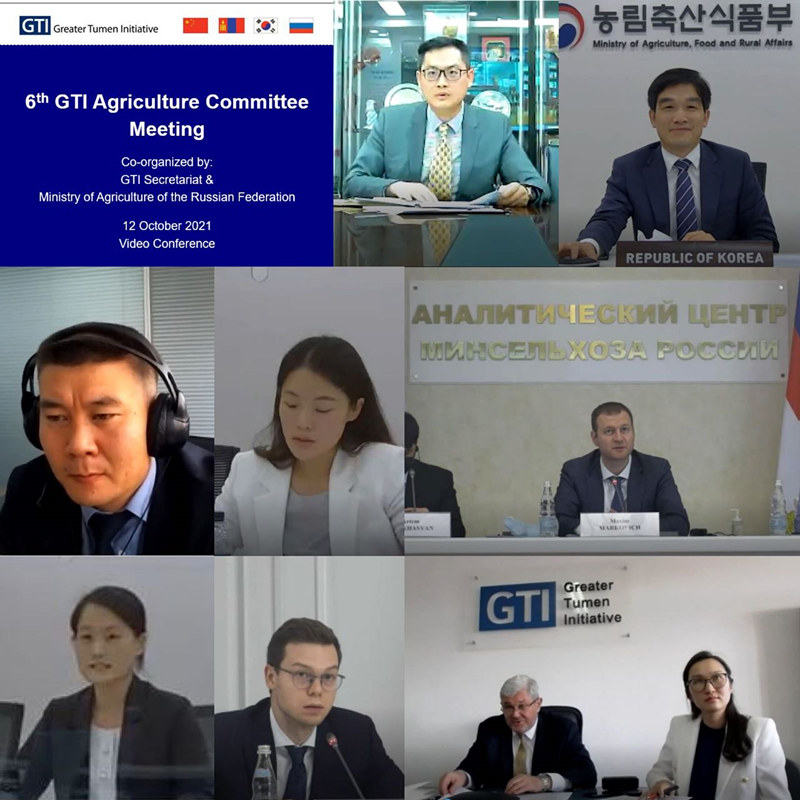
The 6th Meeting of the GTI Agriculture Committee, co-organized by the GTI Secretariat and the Ministry of Agriculture of the Russian Federation was held on 12 October 2021, in the format of video conference, with the participation of central agriculture ministries of the GTI member countries.
The main goals of the meeting were to review the progress of Committee’s work since the previous agriculture committee meeting which was held in September 2020; as well as to share major achievements, international experiences, advantages and opportunities by the GTI member states on trade of agricultural products through e-commerce channels; to comment and approve the 2022 work plan of the GTI Agriculture Committee; and to discuss the projects and activities proposed by the member states.
During the course of the meeting the GTI Secretariat provided a regular update on the implemented and ongoing projects and activities highlighting the updated version of the Committee’s basic guiding document, GTI Agricultural Cooperation Strategic Action Plan (SAP) 2021-2025, which was approved during the 2nd Working-Level Meeting of the GTI Agriculture Committee held via video conference on 3 February 2021.
(Russian Federation) Opening the meeting Mr. Maxim Markovich, Director of the Department of International Cooperation and Agricultural Export Development, Ministry of Agriculture of the Russian Federation, stated that under the impact and restrictions of the Covid-19 pandemic which has affected all areas of economic activities, it is of utmost importance to ensure food security and closest partners and e-commerce is one of the means of developing trade and economic relations in the context of this global crises.
(People’s Republic of China) On this note, Mr. Jiang Jiang, Director of the Division of Asian and African Affairs, Department of International Cooperation, Ministry of Agriculture and Rural Affairs of People’s Republic of China briefed members the development status of rural e-commerce in China in the areas of policy support, digital infrastructure, economic activity, connection between production and sale, e-commerce in poverty alleviation and e-commerce in times of COVID-19. He then briefed on the development of China’s cross-border e-commerce agro-product trade where the Chinese government will set up comprehensive pilot areas for cross-border e-commerce in 46 cities and regions.
(Mongolia) Ms. Delgermaa Sanduijav, Specialist, International Cooperation Division, Department of Policy and Planning, Ministry of Food, Agriculture and Light Industry of Mongolia on the other hand briefed participants on the current development status of e-commerce and reviewed the import and export of cross-border agri-product trade of Mongolia. She mentioned that currently Mongolia’s biggest e-commerce platforms are Facebook, Instagram and Shoppy. Since currently there is no independent law governing the trade relations, which is partially regulated by the Law on Food and the Law on Food Security, as well as by multi-sectoral laws, Ms. Delgermaa stated that more actions are needed to further develop the trade business in Mongolia and ended her presentation by detailing trade policy.
(Republic of Korea) Ms. Choi Joohee, Manager of Overseas Marketing Department, Overseas Business Office, Korea Agro-Fisheries & Food Trade Corporation (aT) then stated that currently Agri-food in Korea was mainly exported offline, which has many limitations in the rapid changing export environment and cause many difficulties for SMEs in terms of marketing, delivering, customer service. She explained that responding to the changing export conditions and new online environment, the Korean Government designed new export policies and plans to expand “Korean food shops” in global platforms to enhance the digital competitiveness of small and medium exporters, as well as to foster online direct export businesses and to reinforce PR in connection with “Hallyu (Korean Wave)”. In addition, the Korean Government hopes to pioneer overseas online markets and enhance online export capacities of SME agri-food export companies in Korea, and to provide the platform for small and medium agri-food exporters to enter online markets.
Furthermore, reviewing the ongoing project Ms. Hwang Youngki, Director of International Agriculture Cooperation Division, Korea Agency of Education, Promotion and Information Service in Food, Agriculture, Forestry and Fisheries (EPIS) presented the progress of the project “Research on Enhancing Smart Agriculture in Greater Tumen Region” which was proposed during the 5th GTI Agricultural Committee (Sept 2020). The project hoped to develop smart farming application strategies to adapt to climate change by analyzing the current status of smart agriculture in each GTI member countries and propose short-term and long-term measures to expand smart agriculture as well as suggest cooperation strategies for promoting smart farm industries in the Greater Tumen Region. Ms. Hwang Youngki said that the research report will be concluded by the end of October this year and will be distributed to the respective agricultural ministries and the GTI Secretariat by November.
Additionally, the Work Plan of GTI Agriculture Committee in 2021-2022 was approved by members stressing to enhance coordination among members and promote agricultural cooperation in partnership with other stakeholders in flexible formats in response to COVID-19.
The next chairmanship for 2022 went to People’s Republic of China where they affirmed commitment to successfully organize the 7th GTI Agriculture Committee meeting.

